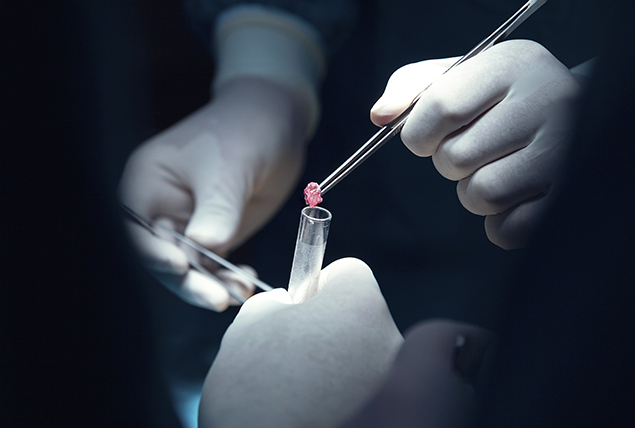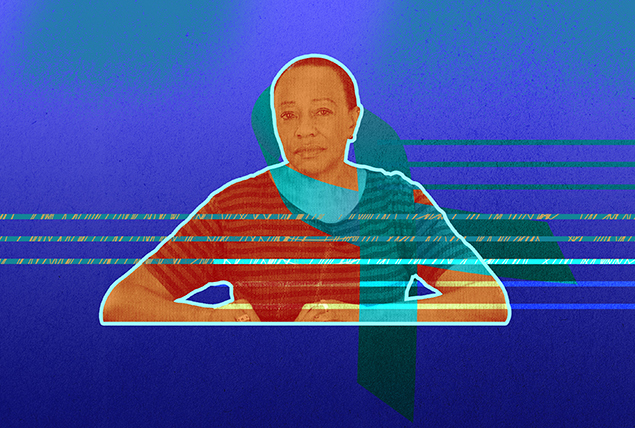What Is the Treatment for Cervical Cancer?

Abnormal vaginal bleeding (after sex, between periods or after menopause, for example), pain during sex, watery or bloody discharge, and pain when going to the bathroom are all symptoms of cervical cancer.
About 14,000 people are diagnosed with cervical cancer each year in the United States. Treatment options vary. Let's view how your diagnosis and treatment for cervical cancer may look.
How doctors diagnose cervical cancer
If you have symptoms of cervical cancer, such as bleeding after menopause, it's best to get formally diagnosed by a medical provider. This usually starts with a Pap smear.
If there are any concerns, you may need an HPV test and a cervical biopsy, which involves a doctor taking a sample of your cervical tissues. Then, if the tests show abnormalities that indicate you have cancer, your doctor will test for whether it has spread.
Even if you don't have symptoms, it's best to get a Pap smear every five years between the ages of 30-65 (or every three for those under 30). Early detection of cancer is crucial for a positive outcome.
Coping with your cervical cancer diagnosis
Learning you have cervical cancer is a lot to take in. You might feel scared, angry, sad or a combination of many emotions. So how can you cope in a healthy way?
You have many options for managing emotional stress caused by a cervical cancer diagnosis. First, take care of your physical health. Try to get enough sleep, eat foods that make you feel good, exercise regularly and spend time outdoors.
Receiving a cancer diagnosis is far from a happy time, but doing activities that typically lift your spirits is still important. Resist the urge to disengage from your life. What did you enjoy before your diagnosis? Watch a comedy, spend time with friends, meditate or engage in a hobby. Socially and emotionally, a support group may help.
The complications of cervical cancer
Address any concerns with your doctor as they happen since complications can worsen as the cancer progresses.
"Complications of cervix cancer and its treatment depend largely on the stage of the cervix cancer and the extent of the necessary treatment," said Clare Bertucio, M.D., a radiation oncologist in Alaska and CEO of Medicine Mama's Apothecary.
Don't wait to start your recommended course of treatment.
"Untreated cervical cancer can cause vaginal bleeding, pain with intimacy and ultimately, unfortunately, eventual death," Bertucio said.
Some additional issues that may occur are foul-smelling discharge, pelvic pain and blockage of the bowel, bladder or kidneys, according to Jill H. Tseng, M.D., a gynecologic oncologist with Providence St. Joseph Hospital in Orange County, California.
What cervical cancer treatment entails
After a diagnosis, how will doctors treat the cancer? The treatment may look a little different than you think. The main three treatments for cervical cancer are surgery, radiation and chemotherapy. You might need one of them or a combination of treatments.
"The treatments for cervical cancer are all excisional in nature," said Laura Purdy, M.D., an OB-GYN based in Tennessee and the chief medical officer of Wisp, a women's sexual and reproductive telehealth provider.
This means the abnormal tissue has to be cut out or removed, she explained.
"This may be done in the office or the operating room, and is a good option for women of reproductive age desiring to preserve fertility," added Aldene Zeno, M.D., a urogynecologist who sees patients at the OB-GYN & Incontinence Center in Glendale and Arcadia, California.
If the cancer hasn't spread too far, you could be looking at a cone biopsy, in which a cone-shaped section of tissue is removed, or a trachelectomy, in which the cervix and nearby tissue are removed.
Cancers that have progressed may require additional treatment.
"Later-stage cancers may require pelvic radiation, and chemoradiation may be added if the disease has spread to other tissues," Zeno said.
If the cancer is advanced, you may need a hysterectomy, the removal of your uterus. You can't have children if your uterus is removed.
To cope with cervical cancer treatments, you may find it helpful to take short naps, do light exercise for small amounts of time, ask for help where and when you need it, stay hydrated and speak with your doctor about hormone replacement therapy (HRT).
Early detection and treatment positively affect survival rates, too. When cervical cancer is diagnosed early, the five-year relative survival rate is 92 percent; if it has already spread to nearby tissues, organs or lymph nodes, the survival rate drops to 59 percent.
The complications that treatment can bring
While treatments can be lifesaving, they may have rough side effects. Ultimately, the effects depend on the type of treatment you receive.
With surgery, Tseng said, you're looking at pain, infection, damage to the bladder or bowel, or difficulty with urination. Chemotherapy, on the other hand, tends to lead to nausea, vomiting, fatigue, hair loss, numbness, tingling in the fingers and toes, low blood counts and a higher risk of infection. Radiation can shorten or narrow your vagina and cause bladder and bowel irritation.
"Cervical cancer is most frequently diagnosed among women ages 35 to 44, so it, unfortunately, impacts a lot of women in their reproductive years," Zeno said. "If caught early, uterine-sparing treatments may be possible. However, later-stage disease requires hysterectomy."
The "big" side effects are less of a concern. Serious, irreversible complications are less common, Tseng added.
Less severe symptoms can be dealt with accordingly. Some ways to cope with the physical side of chemotherapy include light exercise, eating smaller meals, taking anti-nausea medication, drinking enough water and eating easy-to-digest foods.
These tips are a start. Your healthcare professional can provide plenty of information regarding what to expect during and after chemotherapy.
Your life after treatment
Unfortunately, cancer changes not only your life but your body, too. After cervical cancer, you may notice changes, including not enjoying food in the same way, hair loss, fatigue, bathroom problems and painful sex.
By knowing these potential problems ahead of time, you can get ready for them. For example, set aside time to relax, communicate with your partner and reach out to a physiotherapist. Rely on your support team members. It's why they are there.
Speaking of your partner, what does sex look like after cervical cancer recovery? While each person's body is different, you'll likely experience tenderness and scarring in your vagina, so penetrative sex probably won't feel great (or you might notice bleeding afterward). You may experience vaginal dryness, so be sure to have soothing vaginal lube ready.
Lastly, some survivors have a lower sex drive. Don't feel bad if you're not ready to hop under the sheets, because it's certainly understandable, but it is something to talk about with your partner.
Suppose you're excited to have sex again. In that case, some factors to help it go more smoothly are vaginal stretching exercises, lubricant, foreplay, taking it slow, hormone replacement therapy and, as always, communication.
The bottom line
Treatment for cervical cancer can include a mix of methods. Your medical team considers the stage of your cancer to best determine how to proceed. Turn to your support system for help and speak with your doctor whenever you have a question or a new symptom appears.
Don't have a doctor? Giddy Telehealth provides a simple-to-use portal to help you find a new healthcare professional. Browse through hundreds of providers. Many offer same-day appointments and video consultations.


















